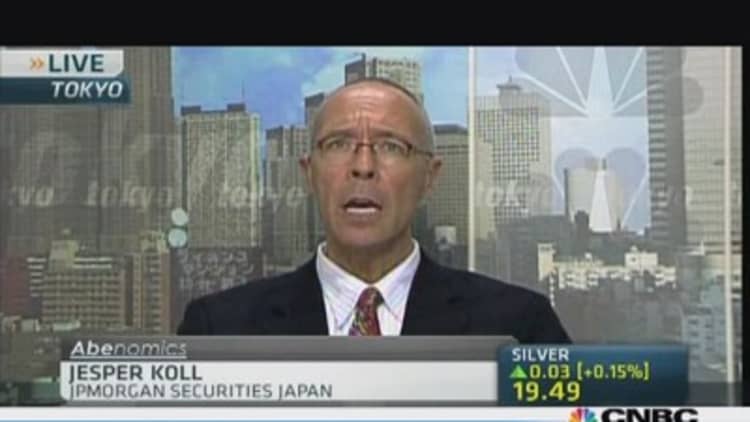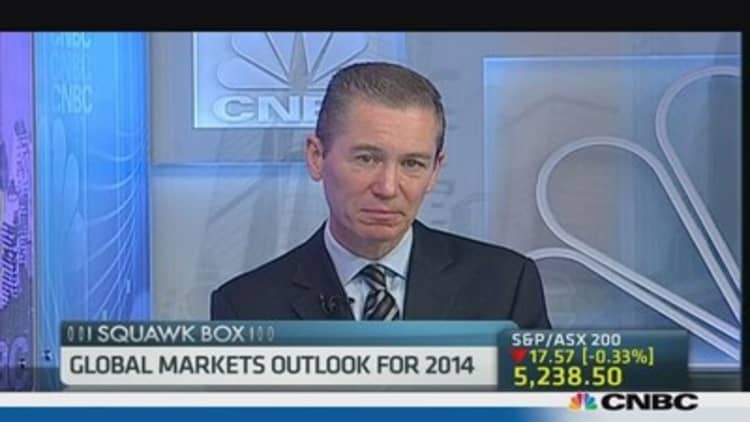After this year's stellar rally in Japan's once-lethargic shares, is it time to start shifting bets to the region's other sleeping giant, China?
The contrast between the two markets this year is stark: Japan's has surged more than 48 percent year to date, compared with the 's around 1.4 percent decline, suggesting the mainland could have value on its side.
But analysts don't appear convinced it's time to make a switch.
(Read more: And the next driver for Japan stocks is…)
"For now, there is one very big market called Topix/Nikkei firing on all cylinders and we expect more. Why should you ask yourself too much about China, which has been a casualty," asked Alain Bokobza, head of global asset allocation at Societe Generale.
"The yen has further to fall; this will send the Nikkei up again. So you have a very, very hard competitor, if you were to look at the competition between China equities and Japan equities in the very short term," he told reporters. Societe Generale has set a Nikkei target of 17,500 for the end of 2014, compared with its current level around 15,400.

But while the yen's value is declining, making its exports more competitive, "the Chinese currency is up, up, up," he said. "China is losing competitiveness because of the currency attached to the U.S. dollar," he said, noting the country's growth prospects are also slowing as it reforms its economy.
"There is less growth, there is declining competiveness; there is (double-digit) wage growth, which affects the profitability of corporations," he noted.
Bokobza's positive call on Japan has a lot of company, making it a consensus pick for the new year amid expectations its central bank will continue and potentially extend its easy money policy, which is likely to keep the yen weak and bolster its shares.
(Read more: Are Japan's stocks still ready to rumble?)
"With the yen in a depreciation trend, Japanese corporate earnings look likely to exceed company projections, putting Japan shares in a relatively favorable position," Kazuhiro Miyake, chief Japan strategist at Daiwa, said in a note this week. He expects the Nikkei 225 index to reach 16,900 by the end of March and 18,500 by the end of 2014.
Data appears to support the view, with Japan's equities trading around 14.5 times 12-month forward consensus earnings, still appearing cheap compared with a long-term average of 17.6 times, according to data from Nomura. A survey of investors attending the bank's investment forum found 76 percent were bullish toward Japanese equities, with more than 50 percent expecting the Nikkei to reach 16,000-18,000 by the end of March.

To be sure, Bokobza's call on China is more of a "not yet," than a "not at all."
"It is the cheapest equity market in the world today," he said. "Low growth prospects, but super cheap" after its valuation contraction.
(Read more: Time to get picky on China stocks: HSBC)
"It was trading above four times book value four years ago. It is now trading around 1.5 times book value. The valuation of the China equity market collapsed. The China equity market risk premium is around 11.5 percent. This is one of the highest in the world," he said. "You have value in China equities and I think at some point you have to go and capture that value."
Around the end of the first quarter, when he expects fund managers may begin reallocating out of the U.S. market, it may be time to consider switching, Bokobza said.
Others are also beginning to size up China's equities.
Goldman Sachs expects around 18-19 percent return from China's mainland and Hong Kong listed stocks.
(Read more: 8.6% China growth next year? What's Deutsche 'smoking?')
"We see 2014 as a year of stable cyclical backdrop, which lays a solid foundation for leadership to kick off an ambitious agenda of structural reforms. The interplay and balance between cyclical stability and reform advancement will be the prevailing driver of returns for the coming years," it said in a note from last week. It expects valuations to re-rate slightly, with around 10 percent earnings growth to help drive gains.
—By CNBC.Com's Leslie Shaffer; Follow her on Twitter @LeslieShaffer1

